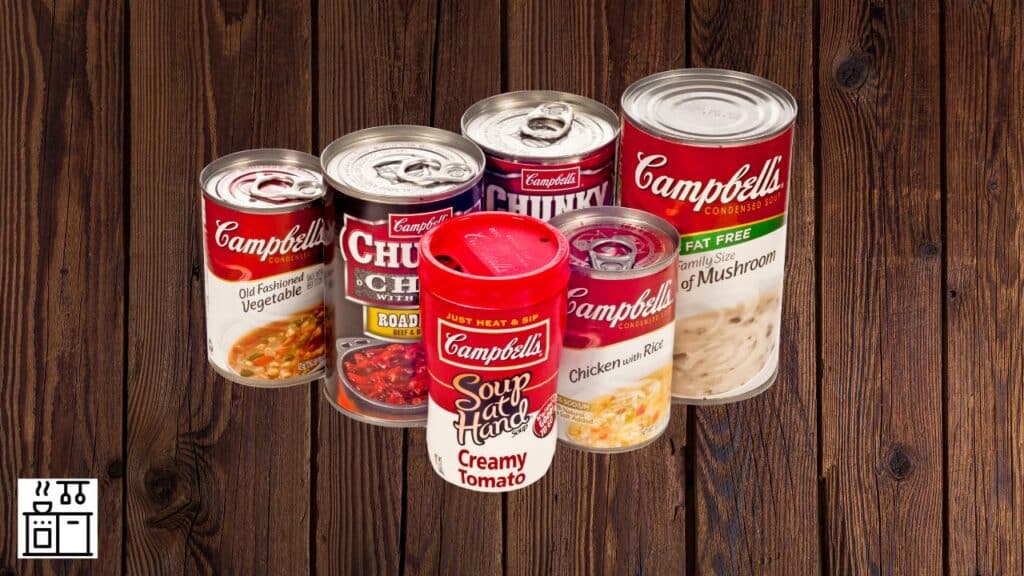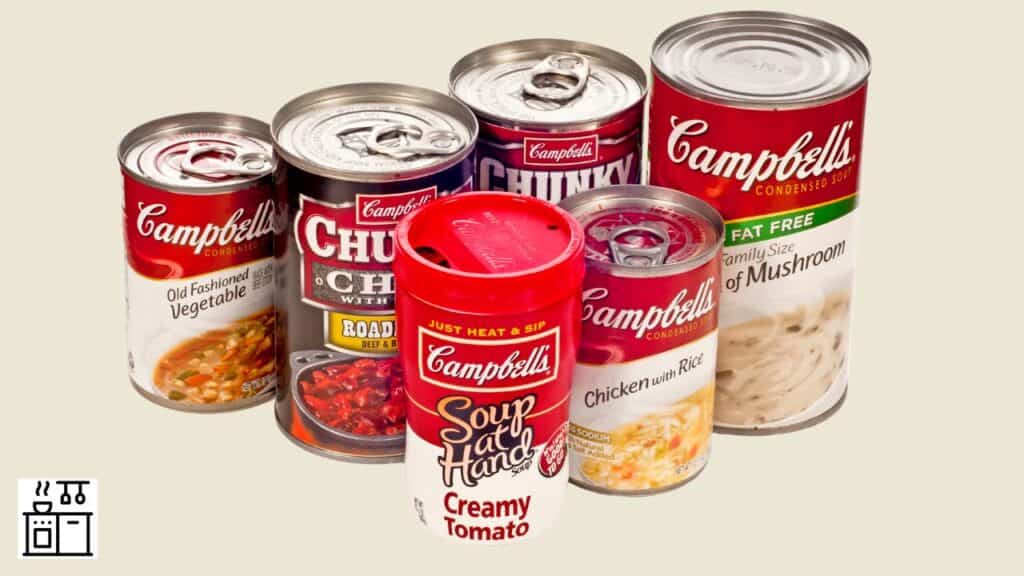Campbell’s soup is a convenient pantry staple that most of us like to stock up on.
Like most canned goods, these soup cans last for a long time. However, they eventually spoil.
So, does Campbell’s soup expire?
Expiration Date of Campbell’s Soup
Campbell’s soup has a very long shelf-life, and the cans don’t carry any expiration date. These soups are generally safe to eat for several years because of the way they have been prepared and preserved. However, the quality of the soup depends on how well you store it. However, it’s better to use the soup within a year or two of buying it.
Although the soup may not necessarily spoil beyond this date, the nutritional quality of the contents can get affected.
How to Make Campbell’s Soup Last Longer?
Campbell’s soup is one of the best items to store in a pantry for later use because of how well it holds up.
These soups are cooked right in the can and sealed securely.
The cans are then heated under high pressure to preserve the contents.
Hence, these soups don’t deteriorate and last for a surprisingly long time.
Although the soup doesn’t spoil for a very long time and holds up well when stored properly, the general recommendation is to use it within two to three years.
The contents may be safe to consume beyond this date, and they will usually taste good.
However, the nutritional quality of the soup can reduce over time.
Nevertheless, Campbell’s soup is a perishable food item, and it will spoil eventually.
So, here are some easy ways to make it last longer.
1. Make Sure that The Cans Are in Good Condition
Campbell’s soup is sealed under high pressure in steel cans with thick airtight lids.
The construction of the can ensures that the contents are isolated from all environmental elements.
The lack of contact with air and moisture helps the soup stay fresh and taste good for several years.
Any damage to the cans will affect the quality of their content.
Hence, it’s essential to properly check the cans for any damage before buying them.
Avoid any dented or rusty cans. Their surfaces shouldn’t be swollen or leaky.
Any change in the physical structure of the cans or surface damage can expose the contents to moisture and air and cause them to spoil.
2. Store the Cans in The Right Location
Campbell’s soup cans are made of solid steel that is tough and impervious to moisture and air.
The thick construction material seals the contents and prevents any damage from exposure to environmental elements.
Nevertheless, it’s also important to store the cans properly to maximize their shelf-life.
Always place the cans in a cool and dry location, like the pantry.
You can also store them in a kitchen cupboard where the temperature doesn’t fluctuate much.
3. Keep the Cans Away from Sunlight
The shelf-life of any perishable food is affected by its exposure to moisture and sunlight.
It’s why food items spoil faster in hot and humid places than in cold places.
Campbell’s soup isn’t an exception to this rule.
Always keep the soup cans away from moisture and sunlight to extend their lifespan.
Store them in a dark place to keep them fresh for longer.
If you live in a humid place, take suitable precautions to reduce the exposure of your pantry items to moisture. Else, use them up quickly.
4. Keep the Cans in A Location Where the Temperature Range Is 50°F to 70°F

Since Campbell’s soup is a canned item, it’s not prone to moisture or heat.
Nevertheless, the general rule of thumb is that you shouldn’t store it in places where the temperature exceeds 70°F.
Don’t keep the cans of soup near the stove or other heat sources that become hot.
It’s also not advisable to keep them in areas of the house that tend to become warm.
So, don’t store them above the refrigerator, near heat furnaces, hot pipes, or on open shelves exposed to sunlight.
This will prevent the contents from becoming warm and help them last longer.
Similarly, avoid keeping them in uninsulated locations like the attic or garage.
When the ambient temperature fluctuates frequently and rises high at any time, the soup cans can spoil faster.
Additionally, continuous exposure to heat and cold will make the contents lose their quality.
Although they may still hold up, they may not be safe to consume beyond this date.
5. Avoid Any Contact with Moisture
You don’t have to worry about moisture affecting the contents of the cans because they are pressure-sealed.
However, if Campbell’s soup cans are continuously exposed to moisture, they can rust.
Tiny areas of rust don’t exactly affect the quality of the contents.
However, if the cans develop enough rust, it can create tiny holes and dents in the surface and affect the quality of the contents.
Even the tiniest holes on the surface will allow bacteria and other germs to enter the can.
These affect the contents, causing food-borne problems.
Hence, it’s always wise to discard any cans with rust marks on them.
The best thing to do is to store Campbell’s soup cans in a dry place.
However, if the place where you stay is humid, take care to eliminate any moisture from the area where you store the soup cans.
Move them away from any dampness in the storage space and use dehumidifying agents to remove any moisture that can affect the cans.
6. Do Not Freeze Campbell’s Soup
While freezing is a good way to help most types of food stay intact for a long time, it’s not recommended for canned soup.
It will not make the food unsafe in any way; however, it will indirectly affect the quality of the contents.
Firstly, freezing the can will compromise the seal because food expands when frozen.
The soup that is compressed in the can will expand, thus affecting the sealing quality.
Additionally, the low temperature can also alter the taste and texture of the contents.
So, when you use the soup after thawing, it may not be as tasty as it should be.
7. Keep It Away from Pests
Campbell’s soup cans are too thick for pests to break through.
So, you need not worry about any rodents or insects biting or breaking these cans to get to the content.
However, the general quality of the cans will get affected if they are exposed to pests.
Decaying insects or rodent droppings are unsanitary and make the cans unhygienic to handle.
You risk contaminating the contents with any pest residue or droppings when you open the can.
So it’s important to constantly monitor the storage location and ensure it’s free from pest infestations.
Additionally, if your Campbell’s soup cans have been in storage for a long time, inspect them closely before using them.
You may have to wipe down the surfaces with a clean cloth to remove any potentially unhygienic substances, even if you don’t spot anything on the surface.

